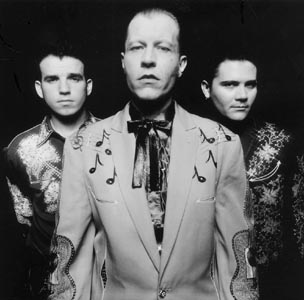Hot Rocks
Sound Salvation: The Rev. Horton Heat, center, walks on the dark side.
The psychobilly gospel according to the Rev. Horton Heat
By Greg Cahill
JIM HEATH--aka the Rev. Horton Heat--lies on a messy bed at the Hyatt in West Hollywood watching a TV special about the drug habits of the rich and infamous, in this case Three Dog Night singer/songwriter Chuck Negron, who spent a $30 million fortune on a heroin habit that led him from pop icon to homeless junkie.
The message: L.A. was his ruin.
"That's gotta be the world's largest addiction, I guess," Heath chuckles malevolently.
Heath--a hell raiser and self-confessed problem drinker--knows a thing or two about bad habits and the pitfalls of the City of Fallen Angels. Given to dark moods and even darker tunes, this post-punk rockabilly guitarist/singer/songwriter is known for live shows that are best described as a hayride through hell, traversing a sordid gin-soaked terrain littered with cheap women, fast cars, drugs, and more than its share of libations.
Offstage, the Texas-born Heath, 39, and his sidekicks--bassist Jimbo Wallace and drummer Scott Churilla--have been known to live up to their rowdy rock 'n' roll image. Last year, for instance, the band taped a red-hot segment at Tramp's in New York City for HBO's prestigious alt-rock showcase Reverb. Moments after the cameras went off, the owner tossed the band out on the street.
"We run into our share of trouble on the road," Heath laments.
Heath is no stranger either to trouble or to the road. Growing up in the gawdawful climate of Corpus Christi--where the eponymous body of Christ is polluted by smoky refinery stacks, bordertown racism, oppressive heat, and clouds of flying pests--he cut his teeth playing '70s rock covers at local dance halls. But it was his introduction to the blues, especially the gritty working-class songs of Howlin' Wolf and Little Walter and the finger-pickin' style of country legend Merle Travis, that influenced his roots-oriented high-octane guitar attack.
That talent--and the ability to deftly plumb traditional country, rockabilly, surf, punk, and lounge music--garnered a spot on the influential Seattle-based Sub Pop label, eventually leading to a major label deal. The band's most recent disc, Martini Time (Interscope), has its share of psychobilly classics, including "Cowboy Love," an ode to gay cowboy bars.
The band used to play the blues club circuit, but bailed out of that scene a few years back. "I decided I wanted to play the loud, crazy, beer-sloshing rock 'n' roll shows," says Heath. "You know, the little polite applause and the swing dancers at the blues club, those were fine, but it wasn't as exciting as playing rock."
THE REV. HORTON HEAT moved to punk and alt-rock clubs. The response was immediate. "We didn't make as much money at those shows," he says, "but the fans we made are the type of fans that buy CDs and helped the band grow."
While crowds know the joy of the butt-kickin' Rev. Horton Heat show, critics have been reluctant at times to warm up to this campy trio, who have taken over the coveted psychobilly crown once worn by the kinky Cramps.
"Well, considering how many crappy bands get into that crappy Spin magazine, yeah, I think it would be good for the world if the Rev. Horton Heat had a gold record," says Heath, firing a round at his favorite target. "Yeah. I want that. Uh-huh."
Which brings us to the subject of music critics in general. "Nothing against you, but I have a big problem with music critics," he continues. "For example, we first started touring all over America and were in every region by 1990, and the No. 1 question that I got asked on those tours was 'So what is this rockabilly thing?' Now they all know about it, but none of them knew diddly until they started talking to the Rev. Horton Heat."
Along with the punkier sensibility came a chance to exploit the darker side of life, though often with tongue firmly planted in cheek. Musically, Heath will tell you that his sound results from his fondness for the flat-five interval and its "crazy dissonance." But it's in the tough lyrics that the dark side really thrives. "I like love songs a whole lot--I really like schmaltzy love songs," he protests. "I've never really written any, though, because I like them to have a darker tone.
"Let's just say that if life was so sweet and fun it wouldn't be so interesting. Like on Real TV, they don't show people getting married; they show footage of people crashing on motorcycles and stuff. Besides, love is never really easy," he concludes. "You can't just write happy songs. It's gotta have some darkness to it, otherwise there's no light. In other words, there's no hope in a song that's just about hope. It's gotta show the consequences of hope failed to show the beauty of hope realized.
"Life is just like music--tension and release."
[ Sonoma County | MetroActive Central | Archives ]
Copyright © Metro Publishing Inc. Maintained by Boulevards New Media.
![]()

Phil Caruso
The Rev. Horton Heat performs Sunday, Jan. 18, at 9 p.m. at the Mystic Theater, 21 Petaluma Blvd. N., Petaluma. Let's Go Bowling opens. Tickets are $15. 765-6665.
From the January 15-21, 1998 issue of the Sonoma County Independent.
![[MetroActive Music]](/gifs/music468.gif)